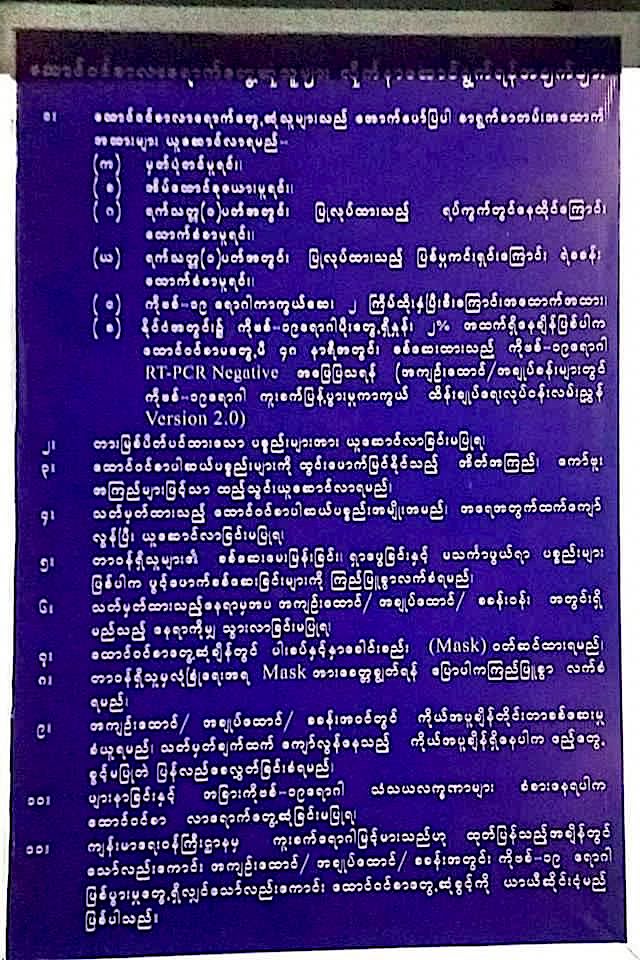The regime is allowing families of inmates to visit them in prisons across the country again, but sources close to lawyers and the correctional department say it is uncertain whether ministers of the ousted National League for Democracy government, including jailed State Counselor Daw Aung San Suu Kyi and President U Win Myint, will be allowed to receive visitors.
Prison visits by families of detainees were suspended in March 2020, following the outbreak of the COVID-19 pandemic. The regime allowed visits by relatives to start again on Tuesday with some restrictions.
Sources close to Daw Aung San Suu Kyi said they have made formal requests to visit the jailed civilian leader, but have yet to receive a reply.
“We have made five requests to visit Aunty [Daw Aung San Suu Kyi] since we heard that prison visits will be allowed again. But there is still no reply,” a source close to her said.
“As for President U Win Myint, he has his family, so his family will ask by themselves. But Aunty [Suu Kyi] does not have family here. So, we have taken the responsibility [of requesting visits].”
The correctional department issued notices at prisons and also informed family members that prison visits could resume.
U Nay Phone Latt, spokesman of the civilian National Unity Government, said: “We don’t know exactly if the state counselor and the president will be allowed for prison visits. Even if the visit is allowed, they would be kept under surveillance throughout the visit, and what they say would be noted down, and reported to authorities like [previous regimes] did before.”

Visitors must bring their original citizenship ID, original household registration certificate, certificate of clearance issued by police, certificate of residence issued by the relevant ward administrator, and a COVID-19 vaccination certificate, according to the regulations issued for visitors.
Prison visits have been allowed at 40 prisons across the country—including Insein Prison in Yangon, Obo Prison in Mandalay, and prisons in Tharyarwaddy, Thayet, Magwe, Myingyan and Dawei—where many political prisoners are kept, according to the Political Prisoners Network-Myanmar (PPN-M).
One hundred prisoners are allowed to receive visits per day, and each visit is limited to 20 minutes. Visits are allowed between 8am and 2pm from Monday to Friday.
Ko Thaik Tun Oo of PPN-Myanmar said: “Only 100 inmates are allowed for visits a day.
So family members will have to wait if inmates are not on that list. Though it is okay for families who live near the prison, family members from afar will have to incur extra costs for meals and accommodation if they have to wait.”
Many political prisoners have been transferred to prisons far from their hometowns where they were arrested, making it more difficult for them to receive visitors.
Ko Thaik Tun Oo said prison visits by family members are a fundamental right of prisoners. The regime is allowing prison visits just to put on a show for the international community, he said.
“They have used COVID-19 as an excuse for banning prison visits. We have pointed out that the pandemic has long been under control. And prisoners are legally entitled to a visit twice a month. COVID-19 is no longer a valid reason for the ban on prison visits.
As United Nations Security Council meetings will be held soon, the regime tries to put on a show of moderate attitude toward prisoners,” he explained.
Family members were queuing outside prisons on Tuesday.
A family member who visited a detainee in Tharyarwaddy Prison said: “Each person is allowed to visit for 20 minutes. Some could meet for up to 30 minutes. Family members have longed to see them.”
A total of 19,610 people remain in prison since the coup and 156 of them have been sentenced to death, according to the Assistance Association for Political Prisoners.

















